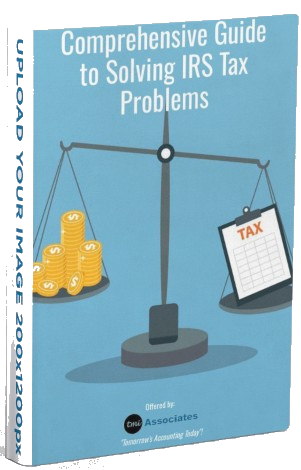IRS & State Tax Resolution

Tax Problem Resolution Services
- Exprienced Accountants with proven strategies
- Will help you with back taxes, tax liens, penalty reductions and more
- Services for individuals and businesses
- Can prepare and file your taxes to simplify your life
OWE THE IRS $10,000 OR MORE?
Many Americans have issues with their back taxes. Owing taxes to the IRS and/or State taxation authorities can be stressful and failure to take action to resolve the problem will quickly worsen the situation. A trusted tax company can help you obtain the optimal agreement with the taxation authorities by using one of or a variety of proven strategies. An experienced tax company understands how the tax system works and can find the best solution for the client and not what the best solution is for the taxation authorities.
A reputable tax resolution service can help individuals file unfiled tax returns, obtain maximum deductions and credits, stop bank levies, stop wage garnishments, help with audits, possibly remove or lower tax penalties, possibly lower debt amount owed, get the taxpayer back into full tax compliance and most importantly prevent future actions from the taxation authorities while keeping your best interest and financial situation in mind.

DOWNLOAD THE COMPREHENSIVE GUIDE TO SOLVING IRS TAX PROBLEMS
HERE IS AN OUTLINE OF
THE COMPREHESIVE GUIDE TO SOLVING IRS TAX PROBLEMS
Resolving IRS tax problems is of utmost importance for individuals and businesses alike. Failure to address these issues can lead to severe consequences, including penalties, interest, and even legal action. This comprehensive guide aims to provide you with the knowledge and strategies to effectively resolve your IRS tax problems.
Overview of the Guide
This guide is designed to walk you through the various aspects of resolving IRS tax problems. It covers a wide range of topics, including understanding common tax problems, the consequences of ignoring tax problems, and how IRS collections work. Additionally, it explores specific programs and options available to taxpayers, such as the Fresh Start Program, Offer in Compromise, Installment Agreements, Currently Not Collectible Status, Penalty Abatement, Innocent Spouse Relief, Bankruptcy and Taxes, and the importance of professional representation. The guide also provides tips for preventing future tax problems and concludes with a recap of key points and resources for further assistance.
Understanding IRS Tax Problems
Before delving into the specific programs and options available, it is crucial to understand the common tax problems faced by individuals and businesses. These problems can range from unpaid taxes and unfiled returns to tax audits and tax liens. Ignoring these issues can have serious consequences, including wage garnishment, bank levies, property seizures, and damage to your credit score. It is essential to address these problems promptly to avoid further complications.
How IRS Collections Work
When you owe taxes to the IRS, they have the authority to take collection actions to recover the amount owed. This can include sending notices, placing liens on your property, and seizing your assets. Understanding how IRS collections work can help you navigate the process and explore options to resolve your tax problems.
The Fresh Start Program
The Fresh Start Program is an initiative introduced by the IRS to assist taxpayers in resolving their tax problems. It aims to provide relief to individuals and businesses struggling to pay their taxes. The program offers various benefits, such as streamlined installment agreements, penalty relief, and opportunities to settle tax debts for less than the full amount owed. However, there are eligibility criteria that must be met to qualify for the program. It is important to understand the benefits and limitations of the Fresh Start Program before applying.
Offer in Compromise
An Offer in Compromise (OIC) is an option available to taxpayers who are unable to pay their tax debts in full. It allows taxpayers to settle their tax debts for less than the total amount owed. Qualifying for an OIC involves demonstrating financial hardship and proving that the offer amount is the maximum amount the IRS can expect to collect within a reasonable period. Calculating the offer amount and submitting the offer require careful consideration and documentation. The OIC process involves a thorough review by the IRS, and it is essential to understand the steps involved.
Installment Agreements
Installment agreements are another option for taxpayers who cannot pay their tax debts in full. These agreements allow taxpayers to make monthly payments over time until the debt is fully paid. Understanding the different types of installment agreements, such as guaranteed, streamlined, and partial payment, can help determine the best option for your situation. Applying for an installment agreement involves submitting the necessary forms and financial information to the IRS. Negotiating the terms of the agreement and managing the payments are crucial for maintaining the agreement successfully.
Currently Not Collectible Status
Currently Not Collectible (CNC) status is a temporary relief option for taxpayers who are unable to pay their tax debts due to financial hardship. Qualifying for CNC status involves demonstrating that paying the taxes would cause significant financial hardship. While CNC status provides relief from IRS collections, it is important to monitor your financial situation and re-evaluate your status regularly.
Penalty Abatement
IRS penalties can significantly increase the amount owed and make resolving tax problems more challenging. Understanding the different types of penalties, such as failure to file, failure to pay, and accuracy-related penalties, is crucial. Qualifying for penalty abatement involves demonstrating reasonable cause for the penalty, such as illness, natural disaster, or reliance on incorrect advice. Requesting penalty abatement requires submitting a written request to the IRS and providing supporting documentation. If the request is denied, appealing the decision is an option.
Innocent Spouse Relief
Innocent Spouse Relief is available to taxpayers who are not responsible for the tax debt incurred by their spouse or former spouse. Qualifying for innocent spouse relief involves meeting specific criteria, such as proving that you did not know about the tax debt or that it would be unfair to hold you responsible. Filing for innocent spouse relief requires submitting Form 8857 to the IRS. The innocent spouse relief process involves a thorough review by the IRS, and if the request is denied, appeals and litigation options are available.
Bankruptcy and Taxes
Bankruptcy can be a solution for taxpayers facing overwhelming tax debts. It is important to understand the different types of bankruptcy, such as Chapter 7 and Chapter 13, and how they can affect your tax debts. Discharging tax debts through bankruptcy requires meeting specific criteria, such as the age of the tax debt and the filing of accurate tax returns. It is essential to consider the tax consequences of bankruptcy, such as potential tax liabilities for canceled debts.
Professional Representation
Seeking professional representation is highly recommended when dealing with IRS tax problems. Tax professionals, such as tax attorneys or enrolled agents, have the knowledge and experience to navigate the complex tax laws and negotiate with the IRS on your behalf. Choosing the right tax professional involves considering their qualifications, experience, and reputation. Working with a tax professional can provide numerous benefits, including peace of mind, accurate advice, and increased chances of a favorable resolution.
Preventing Future Tax Problems
Taking proactive measures to prevent future tax problems is crucial for long-term financial stability. This section provides tips for avoiding tax problems, such as keeping accurate records, filing tax returns on time, and paying taxes promptly. It also explores tax planning strategies, such as maximizing deductions and credits, and staying organized and compliant with tax obligations. Regularly reviewing and updating tax filings can help identify and address potential issues before they become significant problems.
Conclusion
In conclusion, resolving IRS tax problems requires knowledge, strategy, and proactive measures. This comprehensive guide has provided insights into various programs and options available to taxpayers, such as the Fresh Start Program, Offer in Compromise, Installment Agreements, Currently Not Collectible Status, Penalty Abatement, Innocent Spouse Relief, Bankruptcy and Taxes, and the importance of professional representation. Additionally, it has emphasized the importance of preventing future tax problems through tax planning and compliance. By taking action and seeking assistance when needed, you can effectively resolve your IRS tax problems and achieve long-term financial stability. Remember, there are resources available for further assistance, such as tax professionals and IRS publications.

